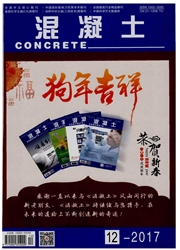

 中文摘要:
中文摘要:
桥梁钻孔灌注桩设计施工已经在青藏铁路多年冻土区广泛使用,但多年冻土区持续低温的水化环境会导致灌注桩混凝土水化反应速率的显著减小,进而减缓灌注桩混凝土早期的强度增长。通过试验研究,完成了多年冻土区桥梁钻孔灌注桩混凝土水化放热特性的定量化分析,确定了灌注桩混凝土在不同持续低温环境下水泥水化程度随龄期变化的增长规律。在此基础上,进一步完成了标准养护环境下以及不同持续低温养护环境下的混凝土立方体强度试验,通过Matlab对试验数据进行处理分析,得出了受持续低温环境影响的混凝土强度与其水化程度对应的增长变化规律。同时应用孔结构测试仪进行了气泡数目、气泡弦长、硬化混凝土空气含量观测等,进一步阐明持续低温环境对灌注桩混凝土强度影响的内在机理。
 英文摘要:
英文摘要:
The design and construction of cast - in - place bored bridge piles has been widely used in the permafrost regions of Qinghai - Tibet Railway, however, the sustained low temperature environment leads to the decrease of the hydration rate of concrete, and to further slows the increase of concrete strengths. By experiment research, completed a quantitative analysis of concrete hydration heat release characteristic in the permafrost regions, and determined the growth rule of hydration heat under different conditions of sustained low temperature environment. On this basis, completed the concrete cube strength test in conservation of standard and different conditions of sustained low temperature environment,using Matlab software completed the analysis of the linear correlation between the compressive strength and the hydration degree in different sustained low temperature, meanwhile,by the micro- pore structure tester observed num- ber of air bubbles, length of air bubbles and air content of hardened concrete, clarified the internal mechanism of concrete strength im- pact under conditions of sustained low temperature environment.
 同期刊论文项目
同期刊论文项目
 同项目期刊论文
同项目期刊论文
 期刊信息
期刊信息
